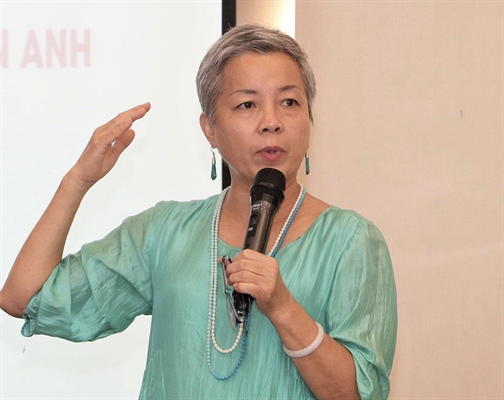.jfif) Opinion
Opinion

In a recent interview with Công An Nhân Dân (People's Police) online newspaper, Nguyễn Vân Anh, Director of Center for Studies and Applied Sciences in Gender - Family - Women and Adolescents talks about the solutions to prevent child abuse as there has been a spate of child abuse recently.

|
| Nguyễn Vân Anh, Director of Center for Studies and Applied Sciences in Gender - Family - Women and Adolescents talks about the solutions to prevent child abuse. — Photo baovanhoa.vn |
Many cases of child abuse have been reported recently, with heart-breaking consequences. What are your thoughts about those cases?
It is true that there has been a spate of child abuse recently. Almost all of those cases happened in a way that we could not imagine. The victims are children and the people who committed the crime, are their parents, relatives or neighbours.
Taking the case of child abuse in Hà Nam Province as an example, the victim’s grandfather could not believe that his grandchild was abused by the house guest. The mother of an 8-year-old girl in HCM City also could not imagine that her child was abused to death by the father. So the public awareness to protect children needs to be changed. The child abuse cases should be addressed on a more comprehensive approach.
The supervision regulations also need to be changed. If a child’s parents are divorced, the parents and relevant departments should have a right to know about the child’s mental and physical health. It is to ensure a safe living environment for a child.
There are around 2,000 child abuse cases a year in Việt Nam, according to the Ministry of Labour, Invalids and Social Affairs' Children Affairs Department. What are the causes?
These 2,000 cases are only the cases which have been detected and reported to the authorities. I think there are more cases than that. The causes might come firstly from the lack of knowledge to protect children from each individual, family or even child and secondly from the lack of care for children.
The thinking of Vietnamese “thương cho roi cho vọt” (spare the rod and spoil the child) for family members or “đèn nhà ai, nhà nấy rạng” (each family only cares about their own affairs) for nearby people should be challenged. People need to exercise more civil responsibility in child protection.
The authorities also have to take responsibility for raising people’s awareness about child protection and building up a programme to teach children how to protect themselves from being abused.
Besides child abuse cases reported to the public, the national hotline on child protection at 111 received 507,861 calls and 1,651 notifications through its application and zalo application in 2021 about child abuse. Do you think that the cases of child abuse are rising and still complicated?
I think recently we have the national hotline 111, the press and social media so people know and have more information related to cases of child abuse. In the past, there might have been similar abuse cases but people did not know or pay much attention to because the mass media had not yet developed. Everything is more developed now so it is easier for people and the authorities to spot the violence.
This shocking number of cases of child abuse will be an alert for parents to remind them of protecting their children.
There are around 17 relevant departments engaging in protecting children at the grassroots level. But there is an opinion saying that the system doesn’t work effectively. What do you think about this opinion?
We have a system to prevent child abuse from the grassroots level but its unprofessional working procedure has led to low efficiency. The shortage of workforce at the grassroots level is also a problem. The network to help children in the community is still lacking.
It is time to assign this task to more professional departments or organisations. The national hotline on child protection at 111 is working well, but the system of 17 relevant departments should be adjusted.
I still think the most important matter for the authorities is that they should raise people’s awareness and educate people about child protection. Each citizen should be educated on how to behave toward their children in case divorce happens. That is the problem that we have to tackle.
In your opinion, what are the solutions to deal with child abuse?
We must educate young people on how to take care of children. So when they grow up, get married and raise their own children, they will know how to protect and take care of their kids. I think this is related to the Government policies.
Parents or divorced couples should have knowledge of child protection. If parents divorce, the commitment and supervision of authorities to a child should be exercised regularly to ensure the living condition of the child.
Children should also be taught at school about their rights and to protect themselves from danger.
The State departments need to focus on reviewing, amending, supplementing and fulfilling the legal system against child abuse. Traditional family education should be strengthened. The responsibility of parents together with schools and society must be enhanced to protect children.
The authorities also need to focus on solving child abuse cases seriously and quickly.
The localities should plan the programmes and action plans to protect children at the grassroots level. The work of protecting children from violence also requires great attention and efforts of the families and communities where the children live. — VNS




